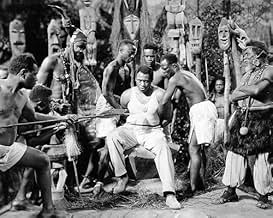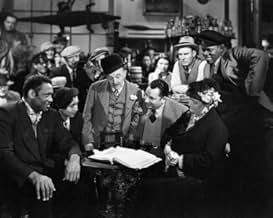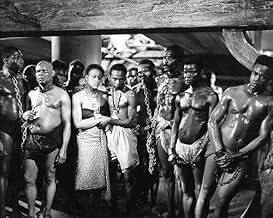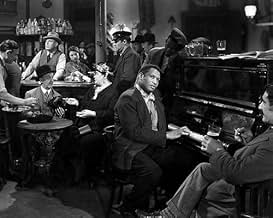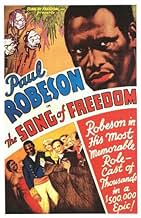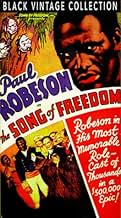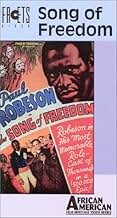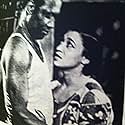A black British dockworker named Johnny Zinga becomes a famous singer and learns that he is the rightful king of the African island of Casanga.A black British dockworker named Johnny Zinga becomes a famous singer and learns that he is the rightful king of the African island of Casanga.A black British dockworker named Johnny Zinga becomes a famous singer and learns that he is the rightful king of the African island of Casanga.
Elisabeth Welch
- Ruth Zinga
- (as Elizabeth Welch)
Bernard Ansell
- Sir James Pyrie
- (as Bernerd Ansell)
Cornelia Smith
- Queen Zinga
- (as Miss C. Smith)
Sydney Benson
- Gate-Keeper
- (uncredited)
Cathleen Cavanagh
- Woman
- (uncredited)
Alf Goddard
- Alf, the Bartender
- (uncredited)
Featured reviews
10PWNYCNY
This movie is about how sheer chance and pure luck and can lead to fame and fortune. Paul Robeson is wonderful. His singing is comparable to that in the 1936 Show Boat, arguably the greatest musical ever made by Hollywood. Paul Robeson is such a commanding presence in this movie that without him this movie could not be made. Also the story is compelling as a man has a chance to fulfill his dream and in the process learn more about himself and his roots. Anyone who gives any thought to their own roots can relate to this movie. It's about a man's quest for cultural and spiritual fulfillment which this movie mots effectively portrays. Also impressive is Elizabeth Welch who plays Mr. Robeson's wife. A good story, well acted, excellent, inspirational songs, all combined to create a great movie.
Greetings And Salutations, and welcome to my review of Song Of Freedom. Before we get into it, here are my ratings:
Story - 1.50 Direction - 1.25 Pace - 1.25 Acting - 1.25 Enjoyment - 1.25
TOTAL - 6.5 out of 10
Song Of Freedom surprised me by putting a smile on my face and a warmth in my heart. For a 1936 film about one African man's dream to find himself and help his people, I wasn't expecting much. Blissfully, I received so much more. The story is well written, intelligent, and finely structured. And not only does it address a couple of major issues it did so at a time other writers, directors, and producers would have steered clear of the subject matter. For one, it's the story of a black man, and Paul Robeson plays the part of John Zinga perfectly. Though it's not only this issue that's highlighted. John has a wife, Ruth, who is portrayed forcefully by Elisabeth Welch. Ruth is a powerful outspoken woman who speaks her mind. In 1936 this was pretty much unheard of, a strong female lead. And, she is a lead. Ruth, being finely constructed, works superbly alongside her husband, John. When they are on the screen together, they demand your attention. It's an ideal pairing of an actor and actress with their characters.
But my delight didn't stop there. The director does an admirable job in putting the tale onto celluloid. Even the stock shots of crowded theatres fit in the movie without drawing undue thoughts. He uses light and shade sublimely to build the tension and unease, especially in the night sequences and imprisonment scenes. But don't get me wrong, it's not perfect. As was the standard back then, whenever there was a chase scene - in Song it's on foot at the start - they speed the film up, giving the segment a Keystone Cops feel, which is terrible. However, it's only a slight thing, so it's easy to accept it and still enjoy the picture.
But, by and far, one of the most pleasurable things about Song Of Freedom is the cast. These actors and actresses are brilliant, and there are no small parts. In one scene, John has invited one of his dockworking buddies to watch his on-stage performance as he's made it as a famous singer. He's talking to him and his wife when he's interrupted by a Lord who may know the secret to the mysterious song that John keeps singing. The dockworker and his wife depart, but not before doffing his cap to the lord and giving an awkward curtsey - the look on the wife's face is outstanding. These trivial elements add depth and believability to the film.
Though I'm not a great fan of musicals, Song is not a typical musical. The music is not integrated into the telling of the story. The music is there because John Zinga is a singer. And a bloody good one at that. Though I will say, Robeson does sound better at acapella than with accompaniment. I would highly recommend Song Of Freedom to anyone who enjoys this style of drama. I thoroughly enjoyed it and will be revisiting it soon.
Please feel free to visit my Dramatisation Of Life to see where I ranked Song Of Freedom.
Take Care & Stay Well.
Story - 1.50 Direction - 1.25 Pace - 1.25 Acting - 1.25 Enjoyment - 1.25
TOTAL - 6.5 out of 10
Song Of Freedom surprised me by putting a smile on my face and a warmth in my heart. For a 1936 film about one African man's dream to find himself and help his people, I wasn't expecting much. Blissfully, I received so much more. The story is well written, intelligent, and finely structured. And not only does it address a couple of major issues it did so at a time other writers, directors, and producers would have steered clear of the subject matter. For one, it's the story of a black man, and Paul Robeson plays the part of John Zinga perfectly. Though it's not only this issue that's highlighted. John has a wife, Ruth, who is portrayed forcefully by Elisabeth Welch. Ruth is a powerful outspoken woman who speaks her mind. In 1936 this was pretty much unheard of, a strong female lead. And, she is a lead. Ruth, being finely constructed, works superbly alongside her husband, John. When they are on the screen together, they demand your attention. It's an ideal pairing of an actor and actress with their characters.
But my delight didn't stop there. The director does an admirable job in putting the tale onto celluloid. Even the stock shots of crowded theatres fit in the movie without drawing undue thoughts. He uses light and shade sublimely to build the tension and unease, especially in the night sequences and imprisonment scenes. But don't get me wrong, it's not perfect. As was the standard back then, whenever there was a chase scene - in Song it's on foot at the start - they speed the film up, giving the segment a Keystone Cops feel, which is terrible. However, it's only a slight thing, so it's easy to accept it and still enjoy the picture.
But, by and far, one of the most pleasurable things about Song Of Freedom is the cast. These actors and actresses are brilliant, and there are no small parts. In one scene, John has invited one of his dockworking buddies to watch his on-stage performance as he's made it as a famous singer. He's talking to him and his wife when he's interrupted by a Lord who may know the secret to the mysterious song that John keeps singing. The dockworker and his wife depart, but not before doffing his cap to the lord and giving an awkward curtsey - the look on the wife's face is outstanding. These trivial elements add depth and believability to the film.
Though I'm not a great fan of musicals, Song is not a typical musical. The music is not integrated into the telling of the story. The music is there because John Zinga is a singer. And a bloody good one at that. Though I will say, Robeson does sound better at acapella than with accompaniment. I would highly recommend Song Of Freedom to anyone who enjoys this style of drama. I thoroughly enjoyed it and will be revisiting it soon.
Please feel free to visit my Dramatisation Of Life to see where I ranked Song Of Freedom.
Take Care & Stay Well.
Sure, the movie is dated in both technique and appearance. But it does have the great Paul Robeson in the central role as a dockworker and social equal of his white work mates. This is at a time when Blacks in American movies were reduced to either menials or buffoons. In terms of stereotypes, Robeson's non-demeaning role takes some getting used to. But try imagining that powerful presence and commanding voice in anything other than a dignified role. No wonder he was widely viewed as a threat to Jim Crow stereotypes.
Perhaps the film's most interesting aspect is what the Westernized Robeson can do for his benighted tribe of ancestors once he returns to them, uninvited. Sure, he can bring those sanitation and medical advances that will improve their collective health. The movie does a pretty good job of dramatizing that aspect, and we're all rooting for him to win out over the tribe's non-scientific methods and the witch- doctor power structure keeping them in place. But what happens after that. Of course, the movie stops at that point, so we don't know. But we do know another area of the continent has been opened to Western presence. The question then is whether Robeson will also bring in Western commercial interests, of much more dubious benefit than the proved health benefits, as history shows. After all, penicillin is one thing, Chevron is another. This remains a point to ponder now that the movie has set up the initial stage.
Despite its shortcomings (the outrageously fey Donizetti, for one), the movie remains an interesting artifact of its time, especially for Robeson's and other Blacks' acceptance into the white working class of London's docks. I'm sure the leftist Robeson found that labor- solidarity aspect particularly appealing. Then too, Elisabeth Welch delivers a fine natural performance as Robeson's loyal wife. We root for the two of them just as we would root for a courageous white couple. Above all, however, the film remains a chance to view one of America's noblest forgotten figuresthe great Paul Robeson.
Perhaps the film's most interesting aspect is what the Westernized Robeson can do for his benighted tribe of ancestors once he returns to them, uninvited. Sure, he can bring those sanitation and medical advances that will improve their collective health. The movie does a pretty good job of dramatizing that aspect, and we're all rooting for him to win out over the tribe's non-scientific methods and the witch- doctor power structure keeping them in place. But what happens after that. Of course, the movie stops at that point, so we don't know. But we do know another area of the continent has been opened to Western presence. The question then is whether Robeson will also bring in Western commercial interests, of much more dubious benefit than the proved health benefits, as history shows. After all, penicillin is one thing, Chevron is another. This remains a point to ponder now that the movie has set up the initial stage.
Despite its shortcomings (the outrageously fey Donizetti, for one), the movie remains an interesting artifact of its time, especially for Robeson's and other Blacks' acceptance into the white working class of London's docks. I'm sure the leftist Robeson found that labor- solidarity aspect particularly appealing. Then too, Elisabeth Welch delivers a fine natural performance as Robeson's loyal wife. We root for the two of them just as we would root for a courageous white couple. Above all, however, the film remains a chance to view one of America's noblest forgotten figuresthe great Paul Robeson.
This Hammer Studio, from London, England which is famous for its horror films surprised me with this great film from 1936 starring Paul Robeson, (John Zinga) who works as a London dock worker and sings songs all the time besides having a great bass voice for the opera and is discovered by a great opera director and producer from London, England. John is always wanting to go to Africa where he came from, but he does not know exactly where he was born, but he still remembers a song which he heard when he was very young. One day John happens to sing this song on stage in an opera performance and this song is recognized by an Englishman who tells him where it comes from and also a charm which John wears around his neck which helped determine its origin. John also has a wife and they both visit this Island and try to introduce themselves to these people and that is when the story gets very interesting. Don't miss this great film from the past, it is a gem in the rough. Enjoy
It's sad that this sort of film simply could not have been made in Paul Robeson's home country at the time due to racism. Instead, Robeson went to the UK and made a few films--too few. I say this because he had a wonderful screen presence and his singing was gorgeous.
Robeson plays 'John Zinga'--a London dockworker descended from royalty back in Africa. Oddly, he lacks a British accent (while Robeson was a brilliant and multi-talented man, apparently a British accent was beyond him) and he has a weird sort of consciousness of his people and Africa within him. It goes far deeper than his interest in his cultural homeland--Robeson's character is fixated on the place and seems to have bits and pieces in the back of his mind about his homeland--though no one apparently ever told him about this--at least as far as he can remember. So, after becoming a huge singing star and learning more about the exact place in Africa where his forebears came from, he takes off for the place to get in touch with his roots.
The second portion of the film takes place an Zananga, Africa. There, Robeson is eventually recognized as a descendant of kings and brings culture, medicine and western civilization to these people--but it is a hard fight to get them to abandon their ineffective ways. It's nice that it's NOT a case of whites bringing this to these 'dark' people but a black man bringing this knowledge to them--making it seem a little less paternalistic. In many ways, this portion of the film seems like a call to other black men and women to return and contribute to their ancestral lands.
Overall, while the film might seem a bit old fashioned today, it really is a remarkable film in many ways. The most obvious is because of its unusual subject mater, but more important aspects should not be lost on the viewer. To have a mainstream film starring a strong and talented black man was very progressive for its day. And, seeing Robeson liked and respected by all as a person--even by his white co-workers. In many ways the film comes off as a bit overly ideal--absent is racism and in this film a good black man can achieve practically anything--a message that must have resonated in the black communities in the UK as well as back home in the States. A daring film and a great chance to see and hear an amazingly gifted man. For more on this, read his biography on IMDb--you'll see what I mean.
Robeson plays 'John Zinga'--a London dockworker descended from royalty back in Africa. Oddly, he lacks a British accent (while Robeson was a brilliant and multi-talented man, apparently a British accent was beyond him) and he has a weird sort of consciousness of his people and Africa within him. It goes far deeper than his interest in his cultural homeland--Robeson's character is fixated on the place and seems to have bits and pieces in the back of his mind about his homeland--though no one apparently ever told him about this--at least as far as he can remember. So, after becoming a huge singing star and learning more about the exact place in Africa where his forebears came from, he takes off for the place to get in touch with his roots.
The second portion of the film takes place an Zananga, Africa. There, Robeson is eventually recognized as a descendant of kings and brings culture, medicine and western civilization to these people--but it is a hard fight to get them to abandon their ineffective ways. It's nice that it's NOT a case of whites bringing this to these 'dark' people but a black man bringing this knowledge to them--making it seem a little less paternalistic. In many ways, this portion of the film seems like a call to other black men and women to return and contribute to their ancestral lands.
Overall, while the film might seem a bit old fashioned today, it really is a remarkable film in many ways. The most obvious is because of its unusual subject mater, but more important aspects should not be lost on the viewer. To have a mainstream film starring a strong and talented black man was very progressive for its day. And, seeing Robeson liked and respected by all as a person--even by his white co-workers. In many ways the film comes off as a bit overly ideal--absent is racism and in this film a good black man can achieve practically anything--a message that must have resonated in the black communities in the UK as well as back home in the States. A daring film and a great chance to see and hear an amazingly gifted man. For more on this, read his biography on IMDb--you'll see what I mean.
Did you know
- TriviaPaul Robeson performs a scene from Louis Gruenberg's operatic version of "The Emperor Jones". He earlier had starred in Eugene O'Neill's original play on Broadway (1923) and in the film version The Emperor Jones (1933).
- Quotes
Gabriel Donozetti: What's the matter the color of his skin, when he has color in his voice! Power! Beauty! I go fighting!
- ConnectionsFeatured in That's Black Entertainment (1990)
Details
- Release date
- Country of origin
- Languages
- Also known as
- Un trono por una canción
- Filming locations
- Production company
- See more company credits at IMDbPro
- Runtime
- 1h 6m(66 min)
- Color
- Aspect ratio
- 1.37 : 1
Contribute to this page
Suggest an edit or add missing content

